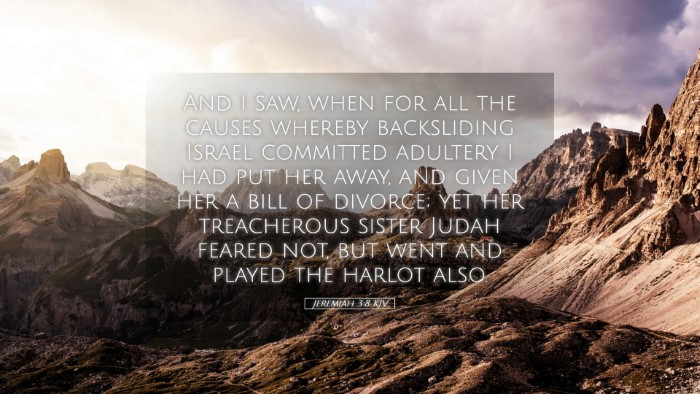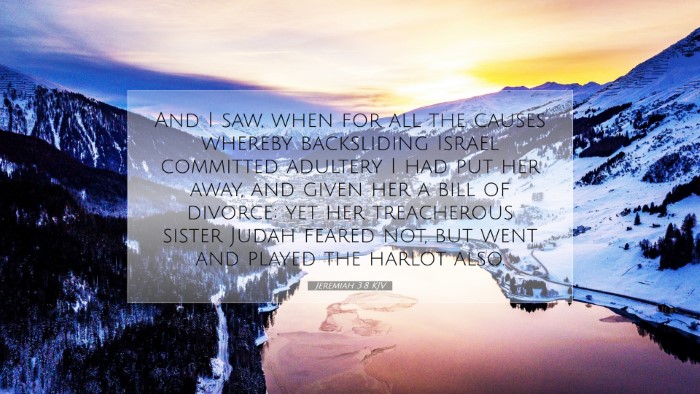Commentary on Jeremiah 3:8
Jeremiah 3:8: “And I saw, when for all the causes whereby backsliding Israel committed adultery I had put her away, and given her a bill of divorce; yet her treacherous sister Judah feared not, but went and played the harlot also.”
Introduction
The verse Jeremiah 3:8 is a poignant reflection on the themes of infidelity and rejection within the covenant relationship God established with His people. It encapsulates God's judgement on Israel (often referred to as the Northern Kingdom) and serves as a warning to Judah (the Southern Kingdom) of the consequences of forsaking faithfulness to God.
Contextual Overview
This chapter paints a vivid picture of spiritual infidelity in the metaphor of marriage. Through the prophet Jeremiah, God expresses His deep anguish over Israel's apostasy, portraying His relationship with His people as one of a faithful husband betrayed by an unfaithful wife.
Historical Background: The backdrop of this verse includes the divided kingdom of Israel, the idolatrous practices of the surrounding nations, and the corresponding spiritual decline of God's chosen people. Both Israel and Judah had strayed from their covenantal duties, provoking God's displeasure.
Insights from Public Domain Commentaries
This commentary draws from the insights of renowned theologians such as Matthew Henry, Albert Barnes, and Adam Clarke, highlighting their interpretations of this significant passage.
Matthew Henry's Commentary
Henry emphasizes the profound sense of loss and betrayal experienced by God. He notes that God had ‘put away’ Israel due to her 'adultery', symbolizing a breach of covenant that is likened to marital unfaithfulness. Henry elucidates that this ‘bill of divorce’ reflects both God's justice and mercy. God allowed Israel's downfall while holding out hope for Judah's repentance.
Albert Barnes' Notes
Barnes posits that the ‘divorce’ depicted here represents a legal act reflecting both God's displeasure and the certainties of judgment. He analyzes the profound implications of this separation, illustrating how Judah's fearlessness in witnessing Israel's punishment serves as a stark warning. Whereas Israel's backsliding led to her destruction, Judah is called to recognize her own sinful tendencies and amend her ways to avoid similar fate.
Adam Clarke's Commentary
Clarke sheds light on the language used in the verse, interpreting ‘playing the harlot’ as a metaphor for idolatry. He argues that Judah's actions reflect a willful ignorance and a direct challenge to God's authority. Clarke further acknowledges the enduring nature of God’s covenant love, arguing that even in divine judgement, God’s desire for reconciliation is evident.
Thematic Elements
The themes present in this verse resonate deeply with the church today and the ongoing struggle against spiritual compromise.
- Spiritual Adultery: The notion of spiritual "adultery" illustrates the seriousness of idol worship and the abandonment of true worship of Yahweh.
- Covenantal Faithfulness: God’s unyielding covenant with His people serves as a standard against which their faithfulness is measured. Judah's neglect of this covenant offers a critical lesson on the importance of remaining steadfast in faith.
- Consequences of Sin: The outcomes of Israel's actions serve as a forewarning that rebellion against God leads to devastating consequences, urges a call for personal and communal introspection.
- God’s Relentless Love and Mercy: Despite the divorce, God’s relationship with Israel is not entirely severed. There remains an offer of return and reconciliation, exemplifying God's mercy.
Application for Today's Believer
The truths found within Jeremiah 3:8 demand earnest reflection in the lives of believers today:
- Examine your own fidelity to God. In what areas might you be falling into idolatry or spiritual complacency?
- Recognize the importance of communal worship and encourage one another to remain true to God’s covenant.
- Understand that while God is just and punishes sin, His mercy persists, and His desire for restoration remains unwavering.
- Respond to God’s call to return if there are areas where you have strayed. Confession and repentance are vital for restoration.
Conclusion
Jeremiah 3:8 is a powerful reminder of the serious implications of spiritual unfaithfulness. Drawing from the rich legacy of Howard, Barnes, and Clarke provides clarity and depth to the understanding of this verse. As leaders, students, and scholars of the Word, the call remains to uphold the covenant relationship with God, recognizing both His justice in judgement and His compassionate offer of forgiveness and renewal.


